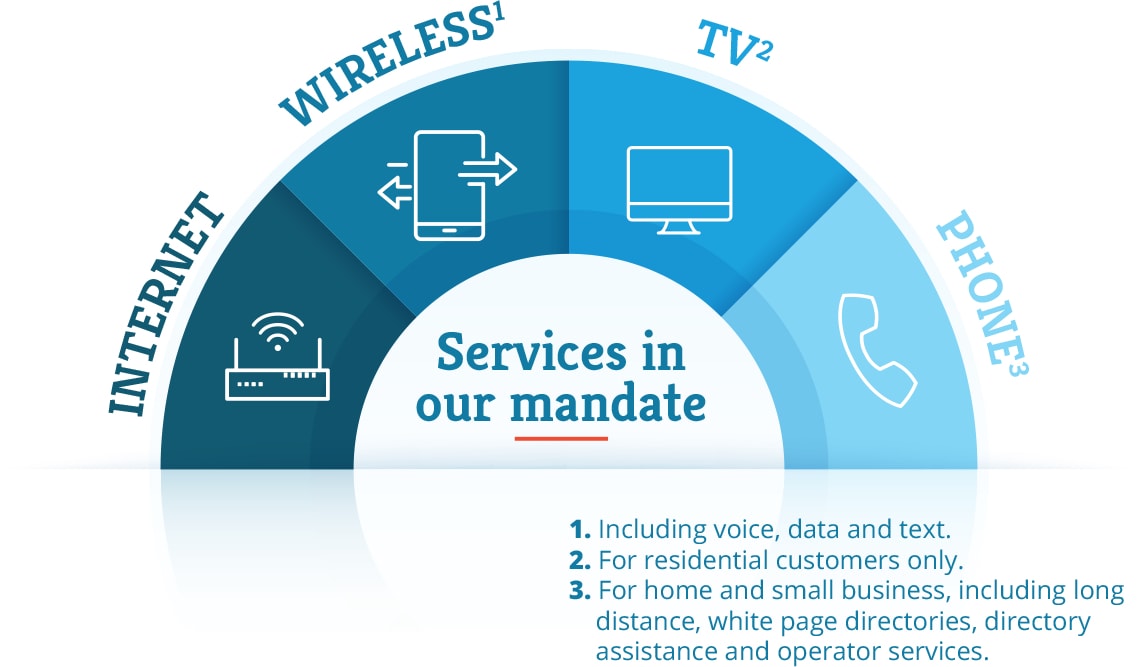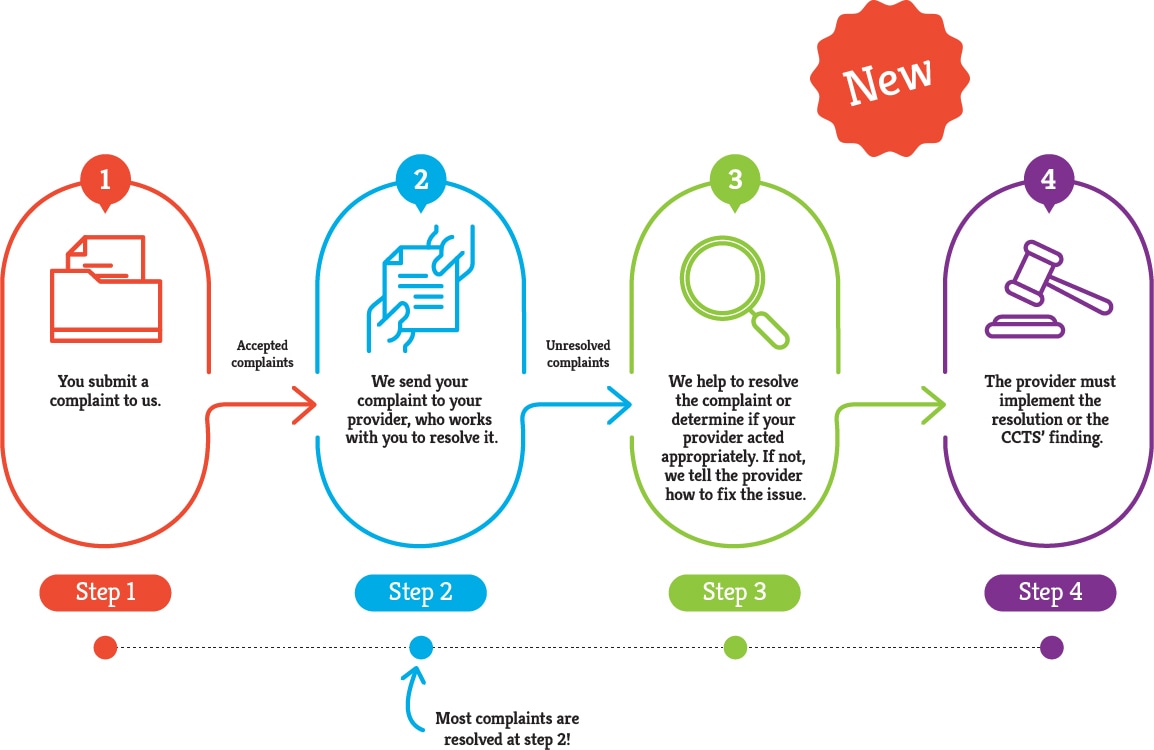Our mandate
The CCTS is a national, independent organization dedicated to working with customers and service providers to resolve complaints about telecommunication and television services. Our structure and mandate are overseen by the Canadian Radio-television and Telecommunications Commission (CRTC).
We work with individual customers, small business customers, and participating service providers to resolve disputes with their telecommunications and TV service providers after efforts between them directly have been unsuccessful.
We can help with most types of problems between a customer and a service provider. These include disputes about:
- contracts,
- billing,
- service delivery, and
- credit management.

Overview of who we are and what we do
“I just wanted to take a moment to express my gratitude for the exceptional support you have provided me. Your quick and thorough responses to my inquiries have been invaluable in helping me navigate and resolve issues. Thank you CCTS!”
Strategic priority to improve our service delivery model and workflow
Our first strategic priority is to deliver efficient, effective, and transparent service to customers and service providers. While the CCTS has always worked to continuously improve our services, we began a comprehensive review of our service delivery in 2019 to plan and resource transformative changes and strengthen our culture of continuous improvement.
In May 2023, we launched our updated complaint-handling process and new complaint-management system. These initiatives were the result of years of consulting stakeholders, reviewing our end-to-end business process, and significant planning and development work.
The redesigned process and technology transformation aims to:
- deliver an even more efficient, effective, and transparent service to customers and service providers;
- build a deeper value-added relationship with our stakeholders;
- address pain points our stakeholders raised; and,
- strike the right balance between the various stakeholder needs.
Our updated complaint-handling process, effective May 23, 2023
Our top priority continues to be ensuring a responsive dispute resolution process that offers customers and service providers outcomes that are fair, timely, and impartial.
Our simplified complaint-handling process is designed to help customers and service providers resolve their issues faster. It also helps them better understand how we make decisions about the complaint.

The main objectives of our process remain the same. The changes aim to streamline and simplify the process:
- We launched an updated complaint form that uses plain language to make it more customer-friendly. The improved form provides customers with more information and guidance. This will help customers include the right information when they submit a complaint. In turn, this helps us to process their complaints more quickly.
- The scope of our mandate remains the same. The types of complaints we can and cannot accept has not changed.
- Our complaint-handling process continues to seek quick and efficient resolutions that satisfy both the customer and the service provider during Initial Referral – the first stage of the process. The time allotted to service providers to respond to the CCTS about their customer’s complaint has been reduced. This will help us to resolve complaints faster.
- Service providers must continue to submit all relevant documents to the CCTS when a complaint remains unresolved.
- We have introduced a new Conciliation stage into our process. Previously, complaints were informally resolved and investigated at the Investigation stage. In the new Conciliation stage, we will informally mediate and explore possible solutions, without going to the time and expense of conducting a full investigation, where it may not be necessary. Ideally our efforts at this stage will lead to more complaints being resolved sooner.
- Where we cannot resolve a complaint informally, we conduct a thorough investigation, following which we now issue Investigation Findings. This document explains whether a service provider met its obligations according to its contract, policies, operating procedures, and regulatory requirements, and, if not, how it must fix the problem. Previously, we issued a Recommendation if we found that the service provider did not meet its obligations. We closed the complaint if they did, or if their proposal to correct the issue was reasonable. Now, all Investigations result in written Investigation Findings, regardless of whether we find a provider has met its obligations or not. This makes our complaint-handling and decision-making rationale more transparent.
- In the new process, customers and service providers can request a Case Review if they believe we made an error of fact or interpretation and that our error affected the Investigation Findings. If it seems more likely than not that we made such an error, we conduct a Case Review. Then, we issue confirmed or amended Investigation Findings.
- We continue to have the same authority to require service providers to fix the issue when their provider has not met its obligations. We can require a provider to explain or apologize for the problem, correct the problem, or reimburse the customer for proven financial losses.
- Service providers must continue to implement all resolutions and remedies in Investigation Findings that the customer has accepted.
On May 23, 2023, we began handling all complaints using our new process. This process came into effect with an updated Procedural Code. The Code sets out the framework for how we accept, investigate, and resolve complaints.
The CCTS reports on complaints concluded between August 1 and July 31 of every year. Therefore, reporting about complaints in this year’s annual report includes:
- Complaints concluded before May 23, 2023, under the old process:
- Pre-Investigation,
- Investigation,
- Recommendation, and
- Decision; and
- Complaints concluded after May 23, 2023, under the new process:
- Initial Referral,
- Conciliation,
- Investigation, and
- Case Review.
Find out more about our updated process, click on Complaint Process Explained.
